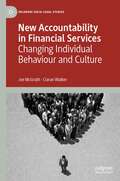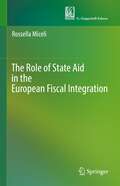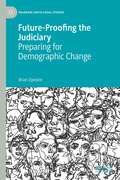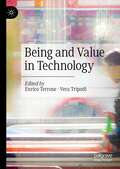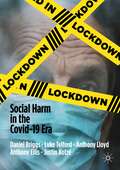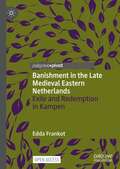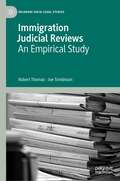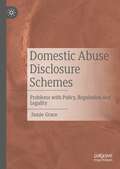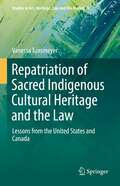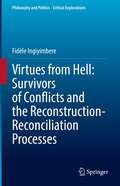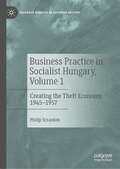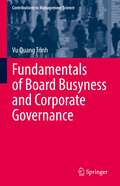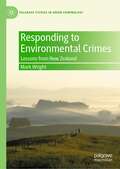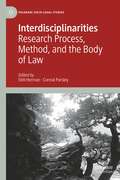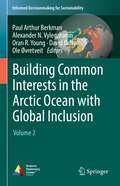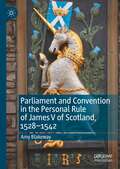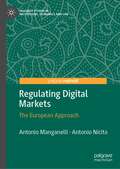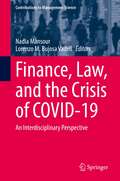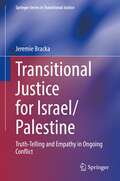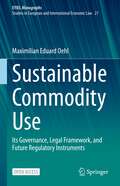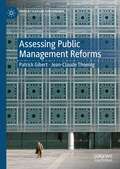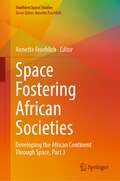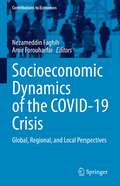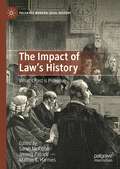- Table View
- List View
New Accountability in Financial Services: Changing Individual Behaviour and Culture (Palgrave Socio-Legal Studies)
by Joe McGrath Ciaran WalkerThis book is a critical examination of recently introduced individual accountability regimes that apply to the financial services industry in the UK (SMCR) and Australia (BEAR and the forthcoming FAR), together with a forthcoming new individual accountability regime ( in particular, SEAR) in Ireland. It provides a framework for analysing whether these regimes will achieve behavioural change in the financial services industry. This book argues that, whilst sanctioning individuals to deter future misconduct is an important part of any successful regulatory strategy, the focus should be on ensuring that individuals in the financial services industry internalise the norms of behaviour expected under the new regimes. In this regard, the analysis in this book is informed by criminological theory, regulatory theory and behavioural science. The work also argues for a “trajectory towards professionalisation” of financial services, and banking in particular, as an important means of positively influencing industry-wide norms of behaviour, which have a key influence on firms’ and individuals’ behaviours.
The Role of State Aid in the European Fiscal Integration
by Rossella MiceliThis book analyzes the issue of European fiscal State aid in order to provide insights into the related evolution prospects and legal problems. State aid has assumed a central position in the field of taxation, becoming the most important instrument of European legal integration, especially in the area of direct taxes. This is the result of major regulatory and interpretative development, which has altered the initial European and national balances in the face of globalization and the problems of the new economy. In this context, the scope and objectives of State aid have progressively broadened, encompassing a significant level of both positive and negative integration of European national tax systems.
Future-Proofing the Judiciary: Preparing for Demographic Change (Palgrave Socio-Legal Studies)
by Brian OpeskinThis book reinvigorates the field of socio-legal inquiry examining the relationship between law and demography. Originally conceived as 'population law' in the 1960s following a growth in population and a use of law to temper population growth, this book takes a new approach by examining how population change can affect the legal system, rather than the converse. It analyses the impact of demographic change on the judicial system, with a geographic focus on Australian courts but with global insights and it raises questions about institutional structures. Through four case studies, it examines how demographic change impacts on the judicial system and how should the judicial system adapt to embody a greater preparedness for the demographic changes that lie ahead? It makes recommendations for reform and speaks to applied demographers, socio-legal scholars, and those interested in judicial institutions.
Being and Value in Technology
by Enrico Terrone Vera TripodiDespite numerous publications on the philosophy of technology, little attention has been paid to the relationship between being and value in technology, two aspects which are usually treated separately. This volume addresses this issue by drawing connections between the ontology of technology on the one hand and technology’s ethical and aesthetic significance on the other. The book first considers what technology is and what kind of entities it produces. Then it examines the moral implications of technology. Finally, it explores the connections between technology and the arts.
Lockdown: Social Harm in the Covid-19 Era
by Daniel Briggs Justin Kotzé Anthony Lloyd Anthony Ellis Luke TelfordThis book asks whether the decision to lock down the world was justified in proportion to the potential harms and risks generated by the Covid-19 virus. Drawing on global, empirical data, it explores and exposes the social harms induced by lockdowns, many of which are 'hidden', including joblessness, mental health problems and an intensification of societal inequalities and divisions. It offers data-driven case studies on harms such as domestic violence, child abuse, the distress of being ordered to stay at home, and the numerous harms associated with the new wealth industries. It explores why some people weren't compliant with lockdown restrictions and examines the already vulnerable social groups who were disproportionally affected by lockdown including those who were locked in (care home residents), locked up (prisoners), and locked out (migrant workers, refugees). The book closes with a brief discussion on what the future might look like as we enter a post-Covid world, drawing on cutting-edge social theory.
The Ultra Vires Doctrine in Corporate Law: A Comparative Review (SpringerBriefs in Law)
by Marco Antonio Jiménez SánchezThis book offers a comparative review of the ultra vires doctrine in corporate law. Divided into three main sections, it first provides a brief overview of the historical background and the scope of the ultra vires doctrine. It then analyses the essential features of the doctrine in the common law and civil law traditions across the Western world. Lastly, the book examines the objects clause, procedural aspects, and the mechanism of ratification of such ultra vires acts. The book's comparative approach and global contextualization of the subject matter will be of interest to readers from around the globe, familiarizing them with legal provisions, case law, and recent literature. Although it is primarily intended for scholars in the area of corporate law, it is also a valuable resource for professionals in the field of commercial law who deal with issues related to the capacity of firms and the powers of their directors.
Banishment in the Late Medieval Eastern Netherlands: Exile and Redemption in Kampen
by Edda FrankotThis open access book analyses the practice of banishment and what it can tell us about the values of late medieval society concerning morally acceptable behaviour. It focuses on the Dutch town of Kampen and considers the exclusion of offenders through banishment and the redemption of individuals after their exile. Banishment was a common punishment in late medieval Europe, especially for sexual offences. In Kampen it was also meted out as a consequence of the non-payment of fines, after which people could arrange repayment schemes which allowed them to return. The books firstly considers the legal context of the practice of banishment, before discussing punishment in Kampen more generally. In the third chapter the legal practice of banishment as a punitive and coercive measure is discussed. The final chapter focuses on the redemption of exiles, either because their punishment was completed, or because they arranged for the payment of outstanding fines.
Immigration Judicial Reviews: An Empirical Study (Palgrave Socio-Legal Studies)
by Robert Thomas Joe TomlinsonThis book analyses how the system of immigration judicial reviews works in practice, as an area which has, for decades, constituted the majority of judicial review cases and is politically controversial. Drawing upon extensive empirical research and unprecedented research access, it explores who brings judicial review challenges against immigration decisions and why, the type of immigration decisions that are challenged, how cases proceed through the judicial review process, how cases are settled out of court, and how judicial review interacts with other legal and non-legal remedies. It also examines the quality of immigration judicial review claims and the quality of the initial administrative decisions being challenged. Through developing a novel account of the operation of the immigration judicial review system in practice and the lived experience of it by judges, representatives, and claimants, this book adds a significant new perspective to the wider understanding of judicial review.
Domestic Abuse Disclosure Schemes: Problems with Policy, Regulation and Legality
by Jamie GraceThis book draws on empirical work to examine the debates surrounding domestic violence disclosure schemes (also known as Clare's Law), focussing on England and Wales with comparisons to similar jurisdictions. Clare's Law allows any member of the public the right to ask the police if their partner may pose a risk to them. This book sets out a coherent methodology for analysing these schemes which are growing in popularity. It discusses their pros and cons and the challenges with operating and regulating them. It ultimately seeks to examine whether the disclosure of information concerning the criminal history of one person to that person's intimate partner will ultimately increase the likelihood of keeping their partner safe. It speaks to academics working in the domestic violence / regulation/ criminal justice/ criminology fields as well as by policy makers in front line services and government agencies.
Repatriation of Sacred Indigenous Cultural Heritage and the Law: Lessons from the United States and Canada (Studies in Art, Heritage, Law and the Market #3)
by Vanessa TünsmeyerThis book examines the ways in which law can be used to structure the return of indigenous sacred cultural heritage to indigenous communities, referred to as repatriation in this volume. In particular, it aims at developing legal structures that align repatriation with contemporary international human rights standards. To do so, it gathers the most valuable lessons learned from different repatriation laws and frameworks adopted in the United States and Canada. In both countries, very different ways of approaching repatriation have been used for several decades, highlighting the context-dependent nature of repatriation. The volume is divided into four parts, looking first at international law, then at the national legal landscape in the United States, followed by Canada, before the different repatriation models are evaluated against the backdrop of human rights law standards. Emphasis is placed not only on repatriation-specific legislation but also on the legal context in which it was developed and operates. In turn, the fourth part develops various models on the basis of these experiences that can be aligned with contemporary indigenous and cultural rights. The book ends by considering the models’ suitability for international repatriation and the lessons that can be learned from them. The primary audience includes those addressing the legal hurdles to repatriation, be they researchers, policymakers, communities, or museums.
Virtues from Hell: Survivors of Conflicts and the Reconstruction-Reconciliation Processes (Philosophy and Politics - Critical Explorations #20)
by Fidèle IngiyimbereThis book offers a critical examination of certain ideas and values—such as remembering, forgiveness, story-telling through Truth and Reconciliation Commissions, etc.—that under-gird the transitional practices and mechanisms of societies emerging from conflicts. It does so by making the survivors’ experience the supreme and ultimate judge of the legitimacy of such practices. While many scholars have dealt with these topics, this book provides a unique perspective on them by using personal stories, narratives and memoirs of the survivors as a checking point of the theoretical elaboration of these ideas and values. By means of an existential phenomenological analysis of the situation of survivors of gross human rights violations, the book assesses how many resources are still available to them, so that they can contribute to the processes of reconstruction and reconciliation of their societies. This analysis constitutes the background for reading the rest of the book, which challenges some assumptions and presumptions of transitional practices such as healing through truth-telling, or providing justice through reparations. It does so by presenting nuanced suggestions on the ways survivors can participate in the reconstruction-reconciliation processes, without jeopardizing their own well-being.
Business Practice in Socialist Hungary, Volume 1: Creating the Theft Economy, 1945–1957 (Palgrave Debates in Business History)
by Philip ScrantonThis study aims to reconstruct the activities of enterprises and individuals over two decades in one developing country (Hungary), within and across four politico-economic domains (agriculture, infrastructure/construction, commerce, and manufacturing), from the initial Stalinist obsession with heavy industry (Volume 1: Creating the Theft Economy, 1945-1957) through later reforms paying greater attention to profitable farming and the provision of abundant consumer goods (Volume 2: From Chaos to Contradiction, 1957-1972, forthcoming 2023). It provides hundreds of grounded, granular stories for reflection, as reported by actors and direct observers, ranging from innovation and improvisation to obstruction, failure, and fraud. Further, it offers an otherwise-unobtainable close encounter with another world, familiar in some respects while amazingly peculiar in others. The social history of enterprise and work in postwar Central European nations “building socialism” has long been underdeveloped. Through extensive macro-level research on planning and policy in Hungary, Poland, Czechoslovakia, and other Bloc countries, a grand narrative has been framed: reconstruction and breakneck industrialization under Soviet tutelage; then eventual mismanagement, stagnation and crisis, leading to collapse. This book seeks to explore what socialism actually looked like to those sustaining (or enduring} it as they faced forward into an unknowable future, to assess how and where it did (or didn’t) work, and to recount how ordinary people responded to its opportunities and constraints. This study will appeal to readers interested in understanding how businesses worked day-to-day in a planned economy, how enterprise practices and technological strategies shifted during the first postwar generation, how novice managers and technicians emerged during rapid industrialization, how peasants learned to farm cooperatively, how organizations improvised and adapted, how political purity and practical expertise contended for control, and how the controversies and convulsions of the postwar decades shaped a deeply flawed project to “build socialism.”
Fundamentals of Board Busyness and Corporate Governance (Contributions to Management Science)
by Vu Quang TrinhThis book delivers the essential concepts and theoretical perspectives of corporate governance and board busyness. It uses the unique context of a dual banking system to capture the potential effects of such aspects on corporate outcomes. Board busyness refers to a board with a substantial proportion of “busy” members who hold multiple directorships. In most cases, directors are “over-boarded,” which means that they hold an excessive number of seats across different boards. The busyness of individuals is gauged to infer their monitoring and recommending abilities through their involvement, efforts, knowledge, skills, and experience, and hence, their behaviour in financial contexts. Yet an assessment of board busyness and its effects is challenging and inconclusive concerning the two opposing arguments surrounding this board attribute: reputation and busyness. The book is the first to thoroughly discuss this up-to-date concept within the dual banking system, and it is designed to help new researchers in this field and students boost their research and academic careers.
Responding to Environmental Crimes: Lessons from New Zealand (Palgrave Studies in Green Criminology)
by Mark WrightThis book provides a critical study of environmental regulation and its enforcement in New Zealand, situated within green criminology. It seeks to address the question of whether the offences in the Resource Management Act 1991 are 'working', by drawing on a range of sources including: central government data, local government policies and reports on enforcement, information requests of councils, studies of local authority enforcement behaviour and case law to. Through highly layered and richly textured analysis, the project exposes the problems that can arise when an expansive approach is taken to offences, penalties and institutional arrangements in an environmental regulatory statute. It emphasizes how discussions of harm and what should be unlawful will ensure that law-makers' enforcement tools will align with their goals for punishment. It examines higher-level issues such as ‘wrongfulness’ and ‘criminality’ in the environmental regulatory context and explores the relevance of its findings to jurisdictions outside of New Zealand. It also discusses the pros and cons of criminalisation and punishment versus restoration. It speaks to those interested in green criminology, regulatory compliance and enforcement, and applications of criminal law.
Interdisciplinarities: Research Process, Method, and the Body of Law (Palgrave Socio-Legal Studies)
by Didi Herman Connal ParsleyThis book illuminates methodology in legal research by bringing together interdisciplinary scholars, who employ a diverse set of methodologies, to address a specific shared research challenge: ‘the body’. The contributors were asked a question: if you were invited to contribute to an edited book on ‘the body’, where would you start and then where would you go? The result is a self-reflective discussion of how and where researchers engage with methodological practices. The contributors draw on their own interdisciplinary research experiences to explore how ‘the body’ might be addressed in their work, and the resources they would deploy in order to carry out the task. This ‘book within a book’ is innovative in both content and format. It provides a rare insight into how top interdisciplinary legal scholars go about making decisions about their research. The shared device of ‘the body’ allows the volume to trace a number of rich approaches into the process of research as practiced by these diverse scholars. In presenting thinking and research in action, the volume offers a new, self-reflective view on the much-addressed theme of the body, as well as taking a fresh approach to the historically vexed problem of research methodology in legal studies.
Building Common Interests in the Arctic Ocean with Global Inclusion: Volume 2 (Informed Decisionmaking for Sustainability)
by Oran R. Young Paul Arthur Berkman Alexander N. Vylegzhanin David A. Balton Ole Rasmus ØvretveitThis book contains an inclusive compilation of perspectives about the Arctic Ocean with contributions that extend from Indigenous residents and early career scientists to Foreign Ministers, involving perspectives across the spectrum of subnational-national-international jurisdictions. The Arctic Ocean is being transformed with global climate warming into a seasonally ice-free sea, creating challenges as well as opportunities that operate short-to-long term, underscoring the necessity to make informed decisions across a continuum of urgencies from security to sustainability time scales. The Arctic Ocean offers a case study with lessons that are especially profound at this moment when humankind is exposed to a pandemic, awakening a common interest in survival across our globally-interconnected civilization unlike any period since the Second World War. This second volume in the Informed Decisionmaking for Sustainability series reveals that building global inclusion involves common interests to address changes effectively “for the benefit of all on Earth across generations.”
Parliament and Convention in the Personal Rule of James V of Scotland, 1528–1542
by Amy BlakewayThis book, based on a fresh understanding of Scottish governmental records rooted in extensive archival research, offers the first study of these important institutions in a period of revived royal authority. The regime which emerges from these records is one which understood the power of consultation, adroitly using a range of groups from full parliaments to conventions of specialists and experts selected to deal with the matter in hand. Policies were crafted through not one single meeting but several types of gathering, ranging from small groups when secrecy was of the essence or complex details required to be hammered out, to elaborate large gatherings when the regime employed a performative strategy to disseminate information or legitimise its policies. Still more impressively, much of this was managed in the King’s absence – James remained at a distance from many of these gatherings, relying on key officials such as the Chancellor or Clerk Register to relay counsel and the royal will. This emphasis on specialised, frequent consultation reflects concurrent developments in the council, whilst relocating debate surrounding the development of state and administrative structures in Scotland traditionally located in the late sixteenth-century into the 1530s. In tackling the development of parliament in Scotland and placing it in its proper context amongst many different forms of consultative meeting this book also speaks to subjects of European-wide concern: how far early modern Parliaments were used to impose or resist religious change, the pace of state formation, monarchical power and relations between monarchs and their subjects.
Regulating Digital Markets: The European Approach (Palgrave Studies in Institutions, Economics and Law)
by Antonio Nicita Antonio ManganelliThis book illustrates the challenges that regulators and policy makers have faced in the transition from the ‘old’ network industries to the new digital ecosystem. It succinctly describes the evolution of digital economy, its main actors, notably global digital platforms, as well as its interactions, interdependences, and trade-offs. Eventually, it proposes insights about why public rules are needed, what kind of rules could be more effective, fair, and efficient, and who should pose and enforce them. The book is opened by an introduction, dealing with Digital Transformation, Big Techs, and Public Policies, which provides a general conceptual and thematic framework to the following analysis but could be also read as a stand-alone paper. The following chapters are grouped in two parts: I. The Evolution of Digital Markets and Digital Rights, and II. Regulating Big Tech’s Impact on Market and Society. The secondary title - the European approach – has a twofold meaning. It highlights the fact that this work has a clear focus on EU law and policy - although the economic and institutional issues addressed are global phenomena, common to all world’s economies. In addition, it also underlines that European digital policy is not yet complete and effective. This book intends to provide a small contribution to the ongoing policy making process, as well as to the wider academic and policy debate.
Finance, Law, and the Crisis of COVID-19: An Interdisciplinary Perspective (Contributions to Management Science)
by Nadia Mansour Lorenzo M. Bujosa VadellThis book analyzes the impact of Covid-19 in different areas such as corporate social responsibility and legislation in SMEs, insolvency law, behavioral finance, government interventions in markets, financial disclosure, the emergence of unregulated financial sectors, the increase of coronavirus-related crimes, and the development of banking regulations in the Covid-19 pandemic, among others.The coronavirus epidemic, which has spread throughout the world, has highlighted the inadequacies of the health and social systems of all states, even the most advanced. The health emergency has required extraordinary measures, especially at the level of laws that are essential for the preservation of lives, health, and livelihoods. The priority for governments and even the international community was, from the outset, to prevent infections and care for those affected. Such a strategy required an unusual increase in health spending, even though it exceeded the State's financial capacity and lacked fiscal space. In addition to this challenge, which has not yet been overcome, there is another, that of redressing the consequences of the measures taken (general containment). It should be pointed out that during health crises, the state may have to review the requirement for transparency because of the emergency, but not free itself from it. The urgency could never be an alibi for a violation of citizens' rights and freedoms.With urgency, financial management systems must be flexible and responsive to all occurrences, while ensuring optimal use of resources and minimizing the risks of fraud and corruption.
Transitional Justice for Israel/Palestine: Truth-Telling and Empathy in Ongoing Conflict (Springer Series in Transitional Justice)
by Jeremie BrackaThis book applies the dynamic field of transitional justice to conflict resolution in Israel/Palestine. Around the globe, diverse societies have pursued truth-telling, restorative justice and reconciliation to end conflict -- yet the language of transitional justice has been all but absent in Israel/Palestine. This volume squarely addresses how transitional justice could contribute to conflict transformation and accountability, incorporating the questions of collective justice, memory, and human rights. It covers the most important historical and legal issues facing Israel/Palestine with a focus on civil societies in South Africa, Northern Ireland and Latin America. Ultimately, the book proposes an unofficial Israeli-Palestinian Truth and Empathy Commission (IPTEC) to address gross human rights abuses committed by both nations.Transitional Justice for Israel/Palestine will be of interest to researchers, NGOs, and policy makers working in transitional justice and societies with ongoing conflict.
Sustainable Commodity Use: Its Governance, Legal Framework, and Future Regulatory Instruments (European Yearbook of International Economic Law #21)
by Maximilian Eduard OehlThis open access book examines the governance and legal landscape of the global commodity sector. For that purpose, the author conceptualises both Global Commodity Governance (GCG) as well as Transnational Commodity Law (TCL). He defines the key terms of Global Commodity Governance, delineates the underlying legal framework of Transnational Commodity Law, and assesses the effectiveness of Transnational Commodity Law in fostering a functional commodity sector. “Sustainable Commodity Use” is based on a comprehensive analysis of over 250 international agreements, standards, and guiding documents. The author distils the main findings into a conceptualisation of Transnational Commodity Law and provides the reader with a succinct overview of its normative configurations as well as regulatory gaps. Moreover, he elaborates a taxonomy of International Commodity Agreements. In addition, an outline of the normative substance of Transnational Commodity Law features in an appendix to the main text. The author concludes by making concrete suggestions on how rules regulating commodity activities de lege ferenda could and should be designed to improve the effectiveness of law regulating transnational commodity activity. In doing so, he demonstrates the application of the sustainable use principle as the overall objective and purpose of Transnational Commodity Law and discusses International Commodity Agreements as future regulatory instruments. This book may assist lawmakers, practitioners, civil society advocates, and academics worldwide in developing a legal framework for sustainable global commodity activity.
Assessing Public Management Reforms (Understanding Governance)
by Jean-Claude Thoenig Patrick GibertThis book examines why many ambitious public management policies do not materialize. Comprehensive reforms do not generate relevant and lasting changes. Yet some evolutions may occur that actually improve the efficiency level inside public administrations. The book identifies how and why such processes may occur. It explores an innovative approach to the way reform policies inside the public sector are assessed. The opening chapters examine the contributions of different disciplines to the study of change in the public sector, before proposing a framework to better understand management developments. The book then reviews eight crosscutting central government programmes successively launched since the late 1960s, examines how these programmes were designed and constructed, and analyses the ways in which three toolkits are appropriated: dashboards and indicators, cost-benefit analysis, and ex post evaluation. The final chapters examine the links between the development of agencification and the way in which central government proceeds to implement it, and demonstrate why and how the structure of human resources is crucial for initiating change processes. Together, the book proposes lessons for public practitioners as well as for academic purposes.
Space Fostering African Societies: Developing the African Continent Through Space, Part 3 (Southern Space Studies)
by Annette FroehlichThis peer-reviewed book provides detailed insights into how space and its applications are, and can be used to support the development of the full range and diversity of African societies, as encapsulated in the African Union’s Agenda 2063. Following on from Part 1 and 2, which were highly acclaimed by the space community, it focuses on the role of space in supporting the UN Sustainable Development Goals in Africa, but covers an even more extensive array of relevant and timely topics addressing all facets of African development. It demonstrates that, while there have been significant achievements in recent years in terms of economic and social development, which have lifted many of Africa’s people out of poverty, there is still a great deal that needs to be done to fulfill the basic needs of Africa's citizens and afford them the dignity they deserve. To this end, space is already being employed in diverse fields of human endeavor to serve Africa’s goals for its future, but there is much room for further incorporation of space systems and data. Providing a comprehensive overview of the role space is playing in helping Africa achieve its developmental aspirations, the book will appeal to both students and professionals in fields such as space studies, international relations, governance, and social and rural development.
Socioeconomic Dynamics of the COVID-19 Crisis: Global, Regional, and Local Perspectives (Contributions to Economics)
by Nezameddin Faghih Amir ForouharfarThis book depicts and reveals the socioeconomic dynamics of the COVID-19 crisis, and its global, regional, and local perspectives. Explicitly interdisciplinary, this volume embraces a wide spectrum of topics across economics, business, public management, psychology, and public health. Written by global experts, each chapter offers a snapshot of an emerging aspect of the COVID-19 crisis for the benefit of academics and students, as well as the institutional, economic, social, and developmental policymakers and health practitioners on the ground.
The Impact of Law's History: What’s Past is Prologue (Palgrave Modern Legal History)
by Marcus K. Harmes Sarah McKibbin Jeremy PatrickThis book considers how legal history has shaped and continues to shape our shared present. Each chapter draws a clear and significant connection to a meaningful feature of our lives today. Focusing primarily on England and Australia, contributions show the diversity of approaches to legal history’s relevance to the present. Some contributors have a tight focus on legal decisions of particular importance. Others take much bigger picture overview of major changes that take centuries to register and where impact is still felt. The contributors are a mix of legal historians, practising lawyers, members of the judiciary, and legal academics, and develop analysis from a range of sources from statutes and legal treatises to television programs. Major legal personalities from Edward Marshall Hall to Sir Dudley Ryder are considered, as are landmarks in law from the Magna Carta to the Mabo Decision.
